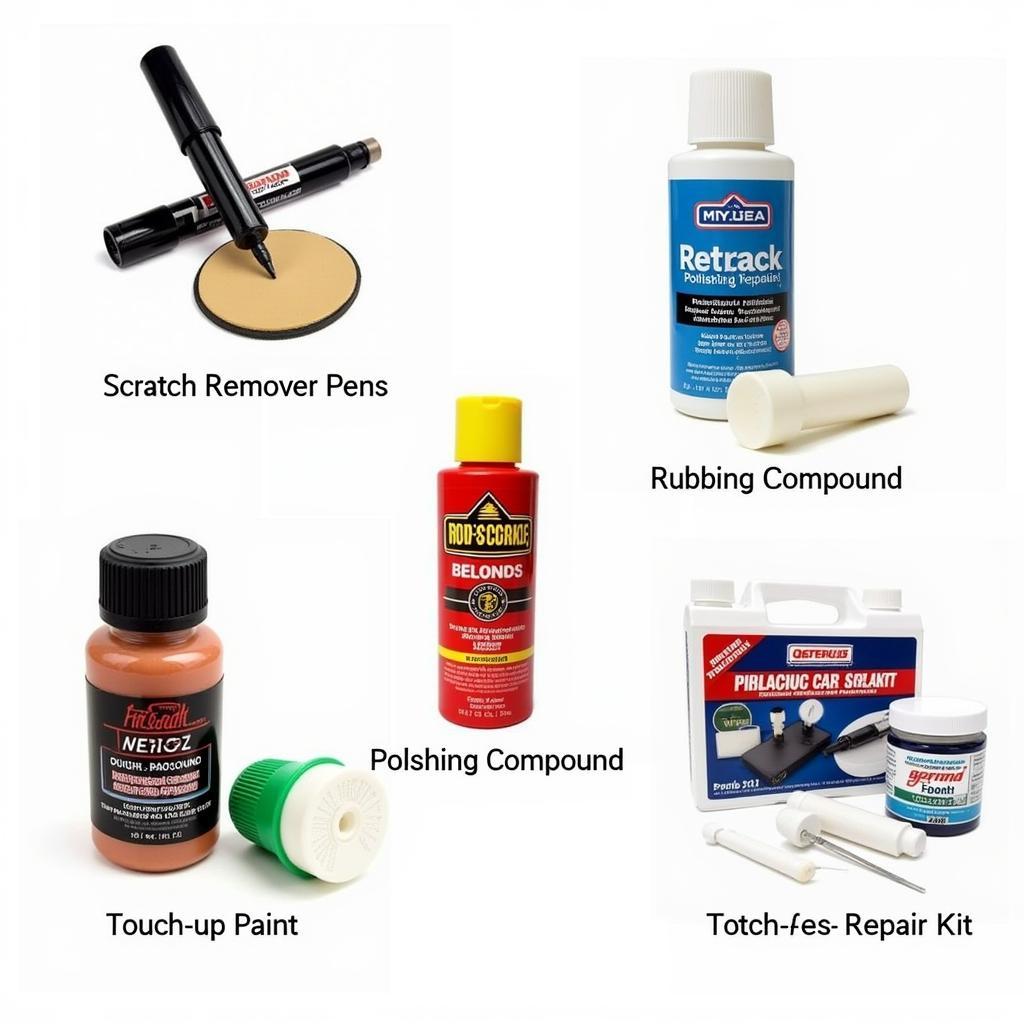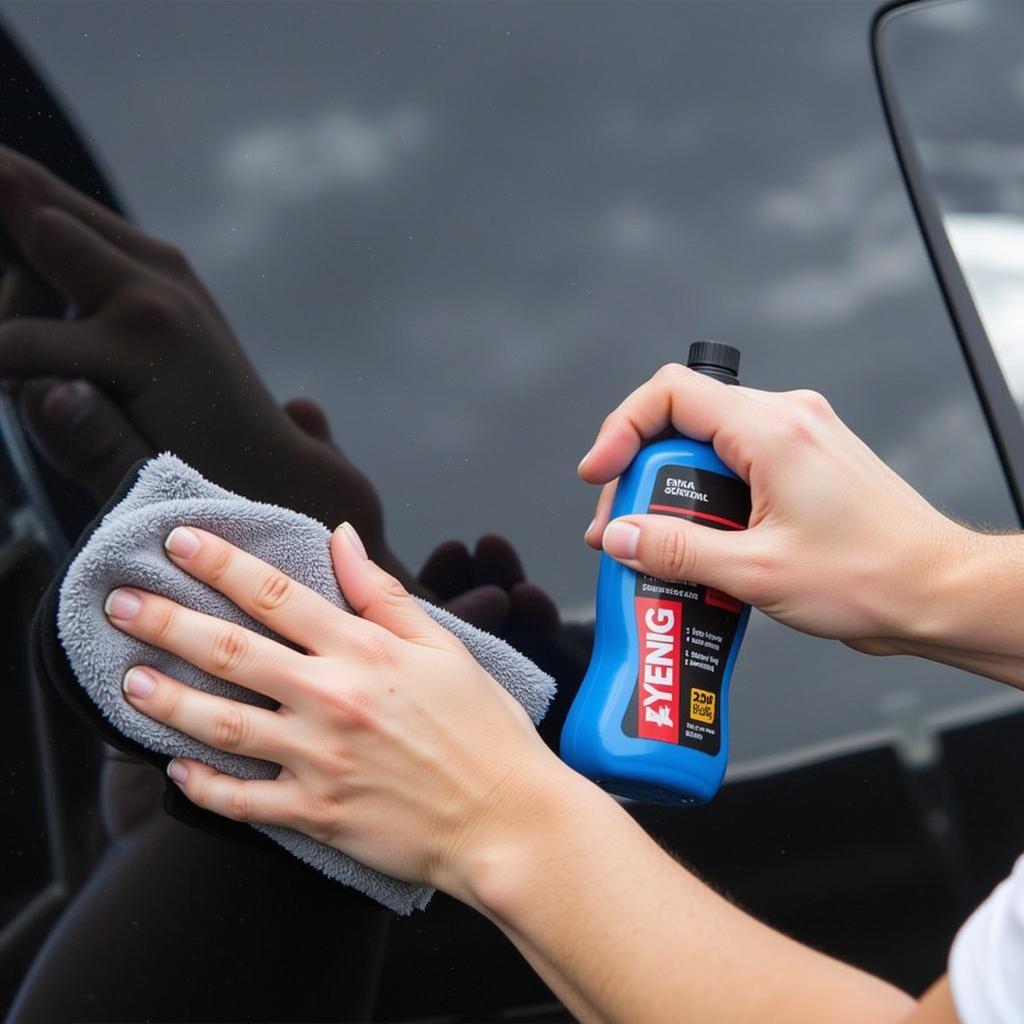Finding the best scratch fixer for your car can feel like navigating a minefield of products. Whether you’re a seasoned car enthusiast, a workshop owner, or a DIY mechanic, this guide will help you understand the nuances of car scratch repair and choose the right solution for your needs.
As car owners, we all dread the inevitable scratches and swirls that mar our vehicles’ otherwise pristine finish. Luckily, advancements in automotive detailing have produced a range of products designed to address these cosmetic imperfections, from minor clear coat scratches to deeper paint damage. Finding the right solution depends on understanding the type of scratch and selecting the appropriate fixer. Check out our article on leather fixer for car for information on repairing leather interiors.
Identifying the Severity of Your Car Scratch
Before diving into the world of scratch fixers, it’s crucial to assess the damage. Scratches are generally categorized into three levels:
- Clear Coat Scratches: These are the most superficial scratches, affecting only the clear coat layer that protects your car’s paint. They often appear as light swirls or hairline scratches and can often be addressed with a simple polishing compound.
- Base Coat Scratches: These scratches penetrate the clear coat and reach the colored base coat of your car’s paint. They’re more visible and require more intensive treatment than clear coat scratches.
- Primer/Metal Scratches: The deepest type of scratch, these expose the primer or even the bare metal underneath the paint layers. These scratches require professional repair to prevent rust and other damage.
Choosing the Best Scratch Fixer for Your Car
Once you’ve identified the type of scratch, you can choose the appropriate fixer. Here are some common options:
- Scratch Remover Pens: These are convenient for quick fixes on minor clear coat scratches. They contain a pigmented resin that fills in the scratch, making it less noticeable.
- Rubbing Compound: This is an abrasive paste used to remove light scratches and swirls from the clear coat. It requires careful application and buffing to avoid further damage.
- Polishing Compound: Less abrasive than rubbing compound, polishing compound is used to refine the paint surface after using rubbing compound or to address very fine scratches.
- Touch-Up Paint: For deeper scratches that reach the base coat, touch-up paint is necessary. Ensure you select the correct color code for your car. After application, the area may need to be leveled and polished.
- Scratch Repair Kits: These kits typically contain a combination of products, such as rubbing compound, polishing compound, and applicators, providing a comprehensive solution for various scratch types.
 Variety of Car Scratch Repair Products
Variety of Car Scratch Repair Products
Applying the Scratch Fixer: A Step-by-Step Guide
Regardless of the product you choose, proper application is essential for optimal results. Here’s a general guide:
- Clean the Area: Thoroughly wash and dry the scratched area to remove any dirt or debris.
- Apply the Fixer: Follow the product’s instructions carefully. Apply a small amount to the applicator and work it into the scratch using gentle, circular motions.
- Buff the Area: If necessary, buff the area with a clean microfiber cloth until the scratch is less visible.
- Repeat if Necessary: For deeper scratches, you may need to repeat the process several times.
You may find our article on car door trim carpet fix helpful if you are dealing with interior damage as well.
Preventing Future Scratches
Prevention is always better than cure. Here are some tips to minimize the risk of future scratches:
- Regular Washing and Waxing: Keeping your car clean and waxed creates a protective layer against minor scratches.
- Careful Parking: Park away from other cars and avoid tight spaces.
- Use a Car Cover: A car cover can protect your car from scratches while parked.
- Avoid Automatic Car Washes: Harsh brushes in automatic car washes can sometimes cause scratches.
 Applying Car Scratch Fixer Using Circular Motion
Applying Car Scratch Fixer Using Circular Motion
“Regular maintenance is key to preserving your car’s finish. A simple wash and wax can go a long way in preventing minor scratches,” says John Davis, an automotive detailing expert with over 20 years of experience.
When to Seek Professional Help
While minor scratches can often be addressed with DIY methods, deeper scratches or those that have penetrated the primer or metal require professional attention. A professional can assess the damage and recommend the best course of action, whether it’s touch-up paint, paint repair, or even repainting the entire panel. For those seeking project cars, consider exploring fixer upper cars for sale in Indiana.
“Don’t underestimate the importance of addressing scratches promptly. Even minor scratches can lead to rust and other problems if left untreated,” adds Maria Sanchez, a certified auto body technician. You might also find our guide on kiss colors and care edge fixer useful for specific paint chip repairs.
Conclusion
Finding the Best Scratch Fixer For Cars requires careful assessment of the damage and selecting the appropriate product. By following the steps outlined in this guide, you can effectively address minor scratches and restore your car’s appearance. For deeper scratches, seeking professional help is essential to prevent further damage. Remember, regular maintenance and preventive measures are crucial for preserving your car’s finish and minimizing the risk of future scratches. For any further assistance or inquiries, please don’t hesitate to connect with us at AutoTipPro. Call us at +1 (641) 206-8880 or visit our office at 500 N St Mary’s St, San Antonio, TX 78205, United States.







Leave a Reply